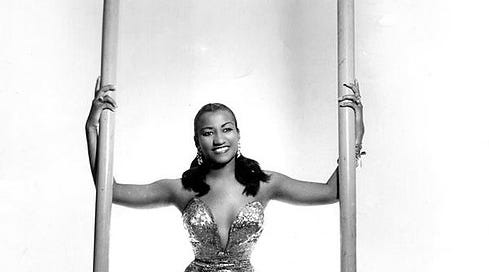Known as the "Queen of Salsa," Celia Cruz was one of Latin American music's most iconic and influential figures.
Born Úrsula Hilaria Celia de la Caridad Cruz Alfonso on October 21, 1925, in Havana, Cuba, Celia grew up in a vibrant musical environment, where from a young age, she displayed a talent for singing, often participating in school recitals and neighborhood events. Despite her father's wish for her to pursue a more conventional career, Celia followed her passion for music, ultimately shaping a legendary career over five decades.
In the 1940s, Celia's talent was recognized when she began singing with local Cuban bands. Her big break came in 1950 when she joined La Sonora Matancera, one of Cuba's most popular orchestras. As the lead vocalist, she brought her dynamic, powerhouse voice to the forefront, blending Afro-Cuban rhythms with a unique emotional depth that captivated audiences.
Celia's career reached new heights during her years with La Sonora Matancera, making her a household name across Latin America. However, the 1959 Cuban Revolution dramatically altered her life. Celia and her band were touring abroad as Fidel Castro came to power. They made the difficult decision not to return to Cuba, resulting in a life of permanent exile. For Celia, this was not just a professional decision but a deeply personal one—her longing for her homeland remained a constant theme in her music and life.
Relocating to the United States in the 1960s, Celia faced the challenge of reestablishing her career in a new country. But here, too, she thrived, developing her signature phrase, "¡Azúcar!"—meaning sugar—which became a rallying cry for joy and celebration, reflecting her vibrant personality and the cultural sweetness in her music. She continued to perform and record, and in the 1970s, her partnership with Puerto Rican bandleader Tito Puente marked a pivotal moment in the popularization of salsa music. Together, they helped elevate salsa—a fusion of Afro-Cuban rhythms with other Latin and Caribbean sounds—into a dominant force in the music scene. Celia's voice, marked by its powerful timbre and expressive range, became synonymous with the genre's rise in the U.S. and globally.
Known for her glamorous and flamboyant stage presence, Celia's performances were electrifying. Her bold, colorful costumes and towering wigs became a hallmark of her shows, reflecting her dynamic personality and pride in her heritage. Celia's impact also went beyond music. As an Afro-Cuban woman in the male-dominated world of salsa, she broke racial, gender and cultural barriers, commanding the spotlight in a genre that often sidelined women while becoming a symbol of pride for Afro-Latinos and an ambassador of Cuban music.
Over the decades, Celia released numerous hit albums across multiple genres of music, including Celia y Johnny (1974) and Ritmo en el Corazón (1988), the latter of which won Celia one of her five Grammy awards.
On July 16, 2003, Celia passed away in Fort Lee, New Jersey.
“La vida es un carnaval” by Celia Cruz:
Sources:
Prieto, Laura R. "Celia Cruz." National Women's History Museum. 2024. https://www.womenshistory.org/education-resources/biographies/celia-cruz
Sierra, Horacio. “The Cuban-American Sound Machine: Nostalgia and Identity in the Music of Celia Cruz, Gloria Estefan and Pitbull.” International Journal of Cuban Studies, vol. 10, no. 2, 2018, pp. 238–65. JSTOR, https://doi.org/10.13169/intejcubastud.10.2.0238. Accessed 15 Oct. 2024.
Wikimedia Commons, Wikimedia Foundation, https://commons.wikimedia.org/wiki/File:Celia_Cruz,_1957.jpg




